Trump’s Electric Vehicle (EV Future ) Policies: What a Second Term Could Mean for the Auto Industry
Former President Donald Trump has made waves with his recent statements on electric vehicles (EVs), leaving many to wonder what his return to office might mean for the future of clean energy and the auto industry. Trump’s stance on EVs has been somewhat contradictory—while criticizing the push towards electric cars, he has also praised Tesla CEO Elon Musk, even hinting at giving him a role in his administration.
With 2024 elections approaching, let’s explore Trump’s policies on EVs, tariffs, and auto jobs—and what could change if he wins.
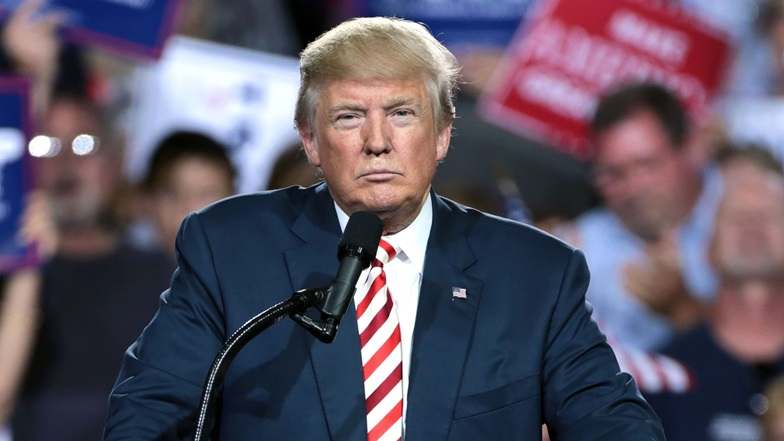
A Mixed History: Trump’s Record on EVs
Trump’s previous term was marked by policies that hindered the growth of the EV industry. He was critical of major automakers, such as General Motors (GM), for their pivot to electric vehicles, calling GM’s all-electric plans a mistake. In 2019, his administration halted the extension of the EV tax credit for Tesla and GM after these automakers hit their sales caps. Additionally, Trump froze fines for fleet fuel-economy violators, a move that may have further discouraged the adoption of EVs.
Key Past Actions:
- Nixed EV tax credits for Tesla and GM in 2019
- Froze fines for fuel-economy violators, indirectly affecting the EV market
- Expressed skepticism about the EV market, citing high costs and limited range
During his campaign, Trump has promised to reverse much of President Joe Biden’s pro-EV policies. For example, he allegedly asked oil and gas CEOs for a $1 billion campaign donation in exchange for scrapping EV policies and other clean energy initiatives. While oil executives were reportedly less than enthusiastic, this signals Trump’s willingness to align himself with traditional fossil fuel interests over clean energy.
Tariffs on the Horizon: China and Mexico in the Crosshairs
One of Trump’s most consistent policy positions is the imposition of tariffs, and he has specifically targeted China and Mexico when it comes to auto manufacturing. Trump has promised a 100% tariff on Mexico-built Chinese cars, including EVs, and he has made it clear that he will punish companies that ship jobs to Mexico. This signals a possible continuation of the dismantling of the North American Free Trade Agreement (NAFTA) initiated during his first term.
In contrast, the Biden administration has already taken steps to impose tariffs on Chinese-made EVs, batteries, and other components. Canada has followed suit, echoing the sentiment that Chinese EVs pose a significant threat to local markets. The tension between Trump’s tariff-heavy policy and Biden’s investment in local manufacturing could have long-lasting implications for automakers.
Comparison of Tariff Policies:
| Trump’s Tariff Plan | Biden’s Tariff Actions |
|---|---|
| 100% tariff on Mexico-built Chinese cars | Tariffs on Chinese EVs, batteries, steel, and more |
| Targeting companies that send jobs to Mexico | Focused on protecting U.S. manufacturing jobs |
| Dismantling NAFTA-like agreements | Maintaining tariffs but incentivizing local production |
Auto Jobs: What’s at Stake?
During Trump’s first term, the U.S. lost 75,000 manufacturing jobs, contradicting his claims of record auto sales and manufacturing. Despite his administration’s efforts to revive the auto industry, manufacturing jobs leveled off after a post-recession recovery that had persisted since the 2008-2010 financial crisis.
In contrast, the Biden administration has seen a significant increase in auto jobs, largely driven by investments in the EV sector. The Environmental Defense Fund (EDF) reported that U.S. investments in EV manufacturing have reached $199 billion since the passage of the Inflation Reduction Act (IRA) in 2022, resulting in 201,900 new EV-related jobs.
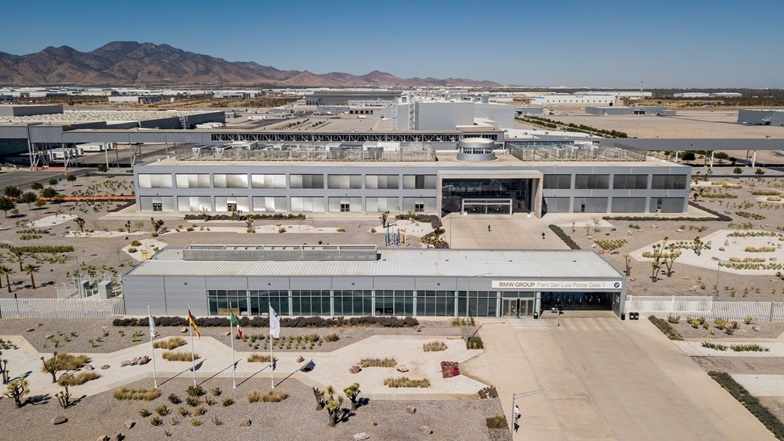
If Trump wins in 2024, there’s uncertainty around whether he would continue these job gains. Despite his pro-manufacturing rhetoric, it’s unclear how his policies would sustain the booming EV sector, which has been vital in creating new jobs in the auto industry.
Jobs Comparison:
| Trump Administration (2016-2020) | Biden Administration (2021-present) |
|---|---|
| Lost 75,000 manufacturing jobs | Created over 201,900 new EV-related jobs |
| Minimal investment in clean energy jobs | $199 billion in EV manufacturing investments |
| Focused on reviving traditional manufacturing | Focused on building EV manufacturing ecosystems |
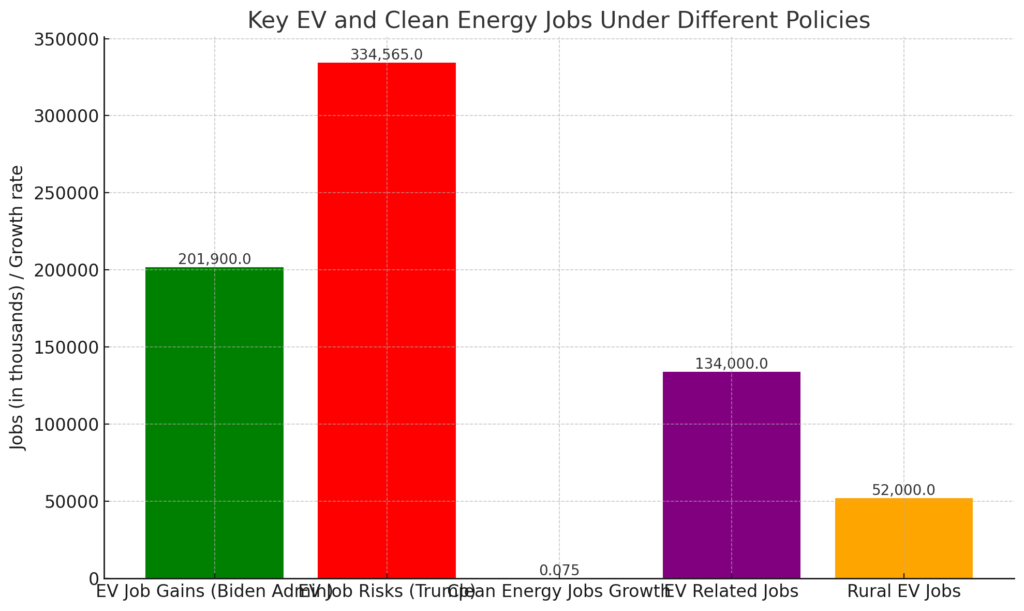
Here is the bar graph representing key points related to EV and clean energy jobs under different policies:
- EV Job Gains (Biden Admin): 201,900 jobs
- EV Job Risks (Trump): 334,565 jobs potentially at risk
- Clean Energy Jobs Growth: 7.5% growth rate
- EV Related Jobs in Low-Income Areas: 134,000 jobs
- Rural EV Jobs: 52,000 jobs
This visual provides a comparison of the job impacts under different administrations and policies.
Climate Policy: Diverging Paths
Trump has made no secret of his disdain for climate change policies, dismissing them as a hoax and promising to bring back coal. His 2024 campaign could see a return to these anti-environment stances, with plans to weaken the Environmental Protection Agency’s (EPA) authority and halt renewable energy initiatives, such as solar and wind power. Trump has previously argued that wind farms kill whales and drive marine life “crazy,” despite no scientific evidence supporting these claims.
Biden, on the other hand, has made clean energy and climate change a cornerstone of his administration. Under the Biden presidency, the clean energy sector has grown twice as fast as overall job growth in 2023. Roughly 75% of clean energy jobs do not require a four-year degree, making them accessible to a broader portion of the workforce. Trump’s return to office could put these gains at risk, potentially stifling the development of clean energy industries that have seen rapid growth under Biden’s policies.
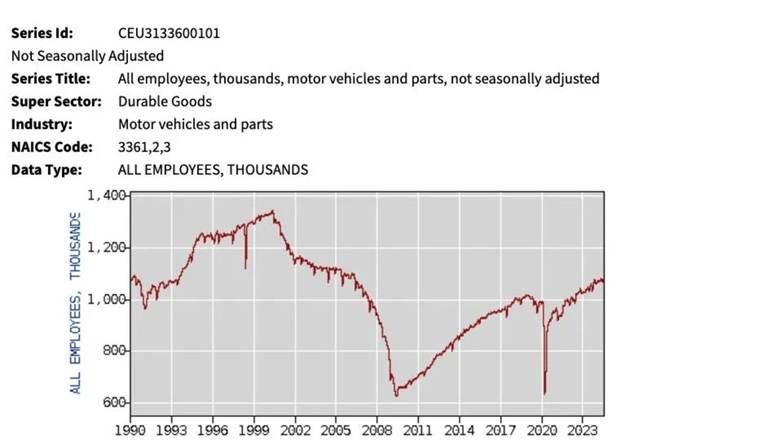
The EV Tax Credit Dilemma
One of the most controversial aspects of Trump’s potential return is his stance on the EV tax credit. In August 2024, Trump mentioned that he would consider ending the $7,500 EV tax credit, although he stopped short of making a definitive statement. This stance is consistent with his efforts during his first term to repeal the credit, which Congress ultimately blocked.
EV Tax Credit Comparison:
| Trump (Potential Second Term) | Biden (Current Term) |
|---|---|
| Possible repeal of the $7,500 EV tax credit | Extended and expanded EV tax credit |
| Critical of tax incentives in general | Incentivized domestic production of EVs |
| Focused on traditional auto manufacturing | Prioritized clean energy and EV adoption |
The Southeastern Red-State Dilemma
A notable point of irony in Trump’s anti-EV stance is that much of the recent investment in EV manufacturing has benefited red states, particularly in the Southeastern U.S. States like Georgia, South Carolina, and Tennessee have been hubs of EV-related growth, with new plants and jobs tied to Biden’s EV policies. As of 2023, about 84% of EV-related investment occurred in 10 states, including several red states that Trump needs to win in 2024.
What happens if Trump dismantles Biden’s EV-focused policies? It could create a rift between Trump and Republican governors whose states have benefited from these investments. While Trump may seek to roll back federal funding, local officials may push back to protect their economies.
States Benefiting from EV Investments:
| States with Major EV Investments | Political Leanings |
|---|---|
| Georgia, Tennessee, South Carolina | Predominantly Red |
| Michigan, Ohio, Illinois | Swing States |
| Nevada | Swing State |
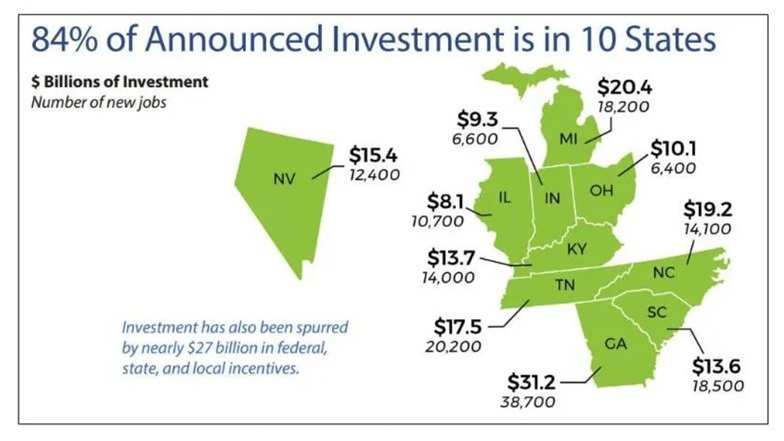
The Musk Factor: A Wildcard for Trump’s EV Policy
Elon Musk, CEO of Tesla and a vocal figure in both the EV and tech worlds, endorsed Trump in July 2024. Trump reciprocated, calling Musk a “brilliant guy” and suggesting that he might appoint Musk to an advisory role or cabinet position. Despite Musk’s heavy reliance on EV-related government subsidies for Tesla’s success, he has occasionally criticized EV tax credits, calling them unnecessary.
Musk’s involvement in a potential Trump administration could lead to unpredictable outcomes. On one hand, Musk could help shift Republican sentiment in favor of EVs, much like Nixon’s rapprochement with China. On the other hand, Musk’s controversial political stances could alienate some potential EV buyers and weaken the very market he helped build.
Two Divergent Auto Futures
As the 2024 election looms, Americans face a stark choice between two very different visions for the future of the auto industry. Trump’s promises to impose tariffs, dismantle EV policies, and potentially roll back tax credits could slow the rapid transition to EVs. Meanwhile, Biden’s pro-EV policies have spurred massive investment, created thousands of jobs, and set the stage for the future of clean transportation.
If Trump returns to office, the U.S. could find itself at a crossroads, torn between legacy internal combustion engine vehicles and a rapidly growing EV market. The choice voters make will have lasting consequences for the economy, the environment, and America’s role in the global auto industry.
Related Post
